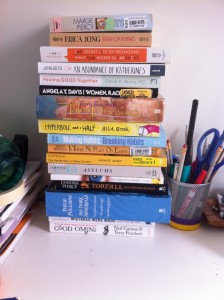
Books read in the last quarter and associated break time. By my count, about 23 books over ten weeks (not all of them pictured).
It’s the first day of my last quarter of undergrad; the hallowed Last First Day.
Winter quarter’s reading list, which was overwhelming and left incomplete (fourteen books for two classes over ten weeks, I ask you.) can be found here. This quarter’s list is far more manageable, and I imagine most of it will be read on buses and planes and trains to conferences and talks.
School Reading:
An Unconventional Family, Sandra Lipsitz Bem
I’ve read this before; sophomore year a housemate was in the psychology of gender class I’m now taking. It’s…weird. Premise: two professors who care about gender equality decide to raise their children (one boy, one girl) in entirely gender neutral ways. The writing is superb, the interviews with the children are enthralling. However, every single time I think about it or am in a class that discusses the Bem family, I am wildly uncomfortable with the metaphorical tapping on the glass that my peers do. How cool! Kids whose parents experimented on them by raising them in an entirely different way than their peers! That’s a touch too close to my lived experience to feel comfortably distant.
The Social Psychology of Gender: How Power and Intimacy Shape Gender Relations: Laurie A. Rudman, Peter Glick
A professor last year once asked the class, how many of us thought gender was primarily the result of underlying biological/genetic components, and how many thought it was the result of socialization. Then, without reacting, the professor asked the class which of them had taken more classes with Professor X (known for discussing socialization in relation to gender) and which had taken more classes with Professor Y (known for discussing the evo/bio basis of gender). Not surprisingly, the answers to the first and second question broke down along the same lines. I’ve not taken any classes with Professor Y, and this
Asian American Women and Men: Labor, Laws, and Love
This class has been interesting so far, but as the textbook hasn’t made it to my doorstep, all I can tell you is that I don’t know much about Asian American-specific gender studies, and that this might fix that.
Memory Alan Baddeley, Michael W. Eysenck, Michael C. Anderson
A textbook! About human memory! For a seminar on the neuroscience of memory! Yeah….that’s about all I know so far.
Just Because Reading:
Labyrinths of Reason: Paradox, Puzzles, and the Frailty of Knowledge, William Poundstone
I found out a few weeks back that after my freshman year, Northwestern offered a freshman-only class on paradoxes, with this as one of the textbooks. It was 1c on Amazon…and now here we are.
I Don’t Want To Talk About It: Overcoming the Secret Legacy of Male Depression, Terrence Real
I’m a few pages in, and find the book interesting, if light on data. Depression is my go-to example of psychopathology getting their maps and territories in disarray, and I’m hoping this might give me a better picture of why exactly we’re having such issues. Failing that, I want a better model of what it feels like/looks like to be a man with depression. The book is (so far) heavy on anecdotes and light on data. Enjoyable to read, but not telling me new information yet.
An Unquiet Mind: A Memoir of Moods and Madness, Kay Redfield Jamison
I’ve read this one before, but have forgotten much of it, except that I keep telling other people that I liked it. I saw Kay Redfield Jamison speak at NU earlier this year, and picked up a copy not long after.
Core Readings in Cognitive Psychology
Things On the Previous List, Still Unread
Willpower: Rediscovering the Greatest Human Strength, Ray Baumeister
I have an odd affection for Baumeister, having once given a very long presentation about why I thought he was wrong. I’ve never read any of his non-academic publications, and since everyone seems to have very certain and completely opposite ideas about how willpower works, I’m starting with the book I hear people citing most in casual conversation.
Thinking, Fast & Slow, Daniel Kahneman
Kahneman’s work on decision-making is worth reading. MegasuperADJECTIVE worth reading. None the least because it’s a nifty shorthand for categorizing feelings in conversation. (“My System 2 knows that this is stupid and completely untrue, but my System 1 is having a lot of trouble with not feeling like I deserve to eat.”)
Creativity: The Psychology of Discovery and Invention, Mihaly Csikszentmihalyi
You know when you get completely caught up in a task and time flies by? You’re working and passionate and impossible to distract? That’s called ‘flow’, coined by Csikszentmihalyi and I haven’t been feeling it. Or the creativity. Which brings us here.
Listening to Prozac, Peter Kramer
A well-known-ish popular psychology book that I keep hearing people reference. I’m overly skeptical–the blurb wonders if Prozac work on character rather than illness–but that might be gimmicky publishing. All things considered, I need to have a better idea of the popular-writing-on-psychiatry.
Against Depression, Peter Kramer
Pennies and pounds and all that–I picked up Kramer’s other book. It seems less sweeping: who has depression, and what’s that like?
The Screwtape Letters, C.S. Lewis
Mike, who gifted me with Good Omens (from last quarter’s list), included The Screwtape Letters, as the demons of the two seem to be similar. I dunno if I agree yet, but I will sharpish.
This list of reading will displace my current Reading List page at the top of Gruntled & Hinged, and will remain up there until mid-June.

Leave a Reply